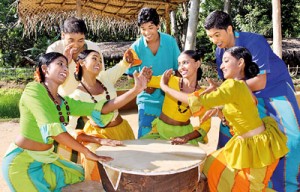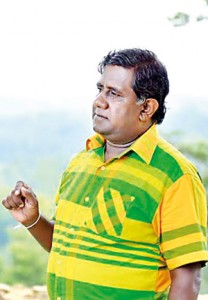The unheard melodies of Avurudu from a distant past

Raban pada are sometimes spontaneous creations
The Sinhala and Tamil New Year is a time when Sri Lankans by and large, take a break from their usual daily routines and observe customs and traditions. As the New Year dawns, the festivities begin- tables are laden with mouth-watering sweetmeats and there is time to join in the many games that are closely related to the celebration of Avurudu. There is music too associated with the celebrations. Everyone knows the many Avurudu songs which are played over the radio but did you know that Avurudu has much more to offer musicwise?
The Avurudu songs aren’t actually traditional but are in fact, much newer additions to the Avurudu festivities. Senior lecturer of the Music Faculty of the University of Visual and Performing Arts, Saman Panapitiya says such songs came into existence after the 1950s. He also attributes the rise of the ‘sarala geethaya’, or simple song, to the rise of the gramophone record which could only retain around three to four minutes of music. This led to the popularity of short songs which could be distributed via records.
Other aspects of the festivities which have music incorporated into them are much older and more traditional. Professor Mudiyanse Dissanayake, Senior Professor of the Faculty of Dance of the University of Visual and Performing Arts says music is intimately connected to almost every aspect of the ancient Sinhala lifestyle. It was an ancient form of stress relief as well as entertainment for the villagers. There is even evidence which suggests that there was music and dance during the time of King Vijaya. Most aspects of village life were accompanied by song.

Prof. Mudiyanse Dissanayake
The ‘raban pada’ is associated with the New Year– rhymes which are recited while playing the drums. The drum used, the ‘banku’ rabana, is played mostly by women. The rhymes are simple verses which may or may not have any meaning to them. They can be played by anyone and are sometimes made up spontaneously to suit the rhythm of the drum beat and are easy to remember. Raban pada differ from area to area.
‘Ankeli’ is a traditional game played only by men. Popular in the days gone by and played as an Avurudu game, Ankeli would sometimes be played to invoke the aid of goddess Pattini. During the game of Ankeli, or hook tugging, men would sing about the beginning of the game and at the end of the game, the victorious team would cheer and sing. Ankeli is said to be the game from which ‘kamba adeema’ or tug-o-war, originated.
‘Eluvan kama’ another popular game is played primarily by women, who hold hands and sing and dance while playing. Their song has a hidden meaning, which speaks of the difficulties they face as women living in a conservative society. The line ‘me vala mokado’ which means why is there this chain, hints at the restrictions they face in society.
In the olden days, everything was connected in some way to music and it’s clear that music played a prominent role in ancient village life, especially during Avurudu. There are even old ‘jana kavi’ or folk poems which are attributed to Avurudu. Here is an example of a poem which describes Avurudu.
‘Bak masa lath meshaya yana rasata
Sak raja lesa divisalu ada sodata
Nek asiri salasa saw sathata
Nikmei suriya devi me lesata’

Saman Panapitiya
The poet speaks of how the sun dresses in finery every April the same way as Lord Sakra does because Avurudu is the festival of the sun in which the sun travels from Pisces to Aries and a new year dawns. There are many more poems which speak of the Avurudu asiri, or Avurudu joy, which begs the question – why aren’t they used more often? Senior lecturer Saman Panapitiya feels this is because people have strayed from traditions and even the media gives less prominence to such poems.
So the next time you hear strains of ‘me Avurudhu kale’, maybe you’ll be reminded that Avurudu music goes way more back in time.



